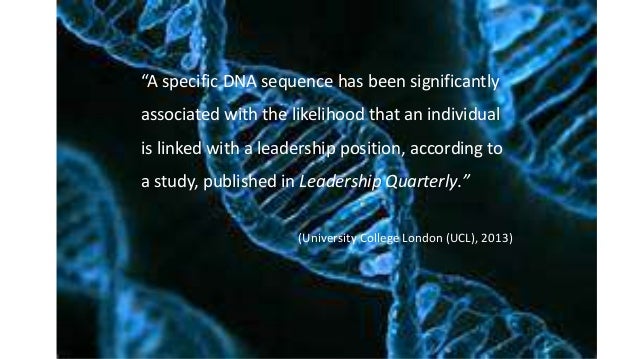Born to rule - A Leadership Gene

It's one of the field's classic questions: Are leaders born
or made?
A new study attempted to answer that by examining
whether people who have a certain gene, the dopamine transporter
DAT1, also hold down managerial roles.
Researchers at Kansas State University and the National
University of Singapore chose to look at that particular gene because
past research has shown the body's
dopamine systems are linked with
things like motivation, impulsivity and self-regulation: all factors that
could have an impact on leadership.
What the new study found was that people who had
a version of the gene, called the 10-repeat allele, were significantly more
likely to have been rule-breakers as teenagers, doing things like skipping
class or underage drinking.
There's a
reason that finding is revelatory. According to Wendong Li, an assistant professor at Kansas State University and a
co-author of the study, past research has shown a link between youthful
rule-breaking and future leadership potential. That means the gene
they studied could, in theory, have a leadership connection.
"All those moderate rule-breaking behaviors can make you
explore boundaries, develop new knowledge and also new skills," Li said in
an interview. "And all that newly acquired knowledge and skills can make
you more likely to become a leader in the future."
As with most research, however, the takeaway was hardly so
clearcut. The study also found that those with the 10-repeat allele were
less likely to have something called "proactive personality,"
or the aptitude for taking initiative and persevering toward their
goals. That somewhat contradicted their other finding, Li said, as
proactive personalities have been clearly linked with leadership potential in
past research.

The study used two data samples (one with roughly 300
people, another with about 13,000) that gathered information on their
DNA, personality traits, behavior and professional history. Though the
researchers uncovered those two interesting genetic links, they didn't
find the crown jewel of correlations — which would have been
if study participants with the specific allele were also the ones holding
top managerial roles.
Li said he wasn't disappointed, or surprised, the research
didn't show that clear link. "A gene is not magically going to make
you become a leader," he says. Still, he finds it worth examining the
many ways in which a person's overall genetic makeup, combined with other
biological factors and, of course, environment and experience, can have some
influence on who ends up taking charge and who doesn't.
Li also posits that someday people may be as curious
to know about their genetic propensity for leadership as they already
are about their genetic propensity for health issues.
He does not, however, think employers should — or ever will —
examine employees' genes when searching for future leaders. In fact,
he says research like his may even serve an opposite purpose: It
can be a reminder that there is incredible variation
among employees, and bringing out each worker's best usually
requires personalized management approaches.
That's not to say we'll customize our management practices
according to people's genes, Li explains. "But what we can do is take our
differences more seriously — either employees' personality traits or their
intelligence or interests — to customize our work schedules, our training and
our development."
A gene has been uncovered that may help to create born leaders.
The leadership gene, known as rs4950, is an inherited DNA sequence
associated with people taking charge.
Scientists accept that leadership skills are also learned. But the gene may
provide the vital push needed to make someone into a manager rather than a
minion.
Researchers found the gene after analysing DNA samples from around 4,000
individuals and matching them to information about jobs and relationships.
Workplace supervisory roles were used as a measurement of leadership
behaviour.
The study showed that a quarter of the observed variation in leadership
traits between individuals could be explained by genetics.
Lead scientist Dr Jan-Emmanuel De Neve, from University College London,
said: "We have identified a genotype, called rs4950, which appears to be
associated with the passing of leadership ability down through generations.
"The conventional wisdom - that leadership is a skill - remains
largely true, but we show it is also, in part, a genetic trait."
The findings appear online today in the journal Leadership Quarterly.
Some of the greatest leaders in recent history include Martin Luther King,
Gandhi, Nelson Mandela and Sir Winston Churchill.
But leaders do not necessarily have to be heroic or good. Adolf Hitler,
Joseph Stalin and Genghis Khan were also great leaders in their own way.
The new research suggests at least the possibility that some of these
historic figures were blessed with the leadership gene.
Despite the importance of the gene, acquiring a leadership position still
mostly depends on developing the necessary skills, say the researchers.
"As recent as last August, Professor John Antonakis, who is known for
his work on leadership, posed the question: 'is there a specific leadership
gene?'
"This study allows us to answer yes - to an extent. Although
leadership should still be thought of predominantly as a skill to be developed,
genetics - in particular the rs4950 genotype - can also play a significant role
in predicting who is more likely to occupy leadership roles."
More research was needed to understand the ways in which rs4950 interacted
with other factors, such as a child learning environment, he added.
Thanks for reading my blog.
Are you Leading?
Dr. Deepak A. Patil
CEO, Lead ThySelf

Comments
Post a Comment